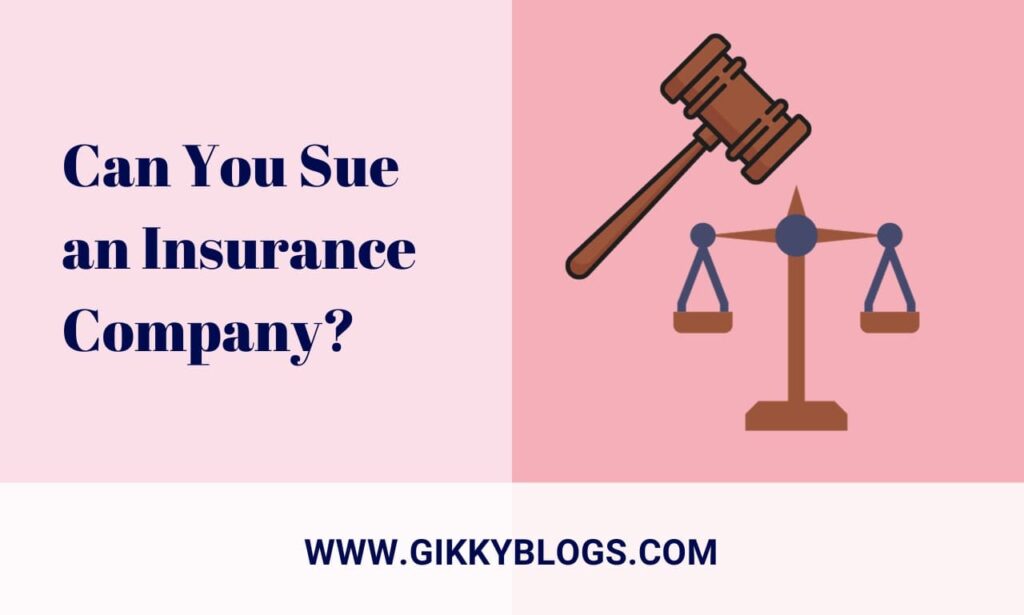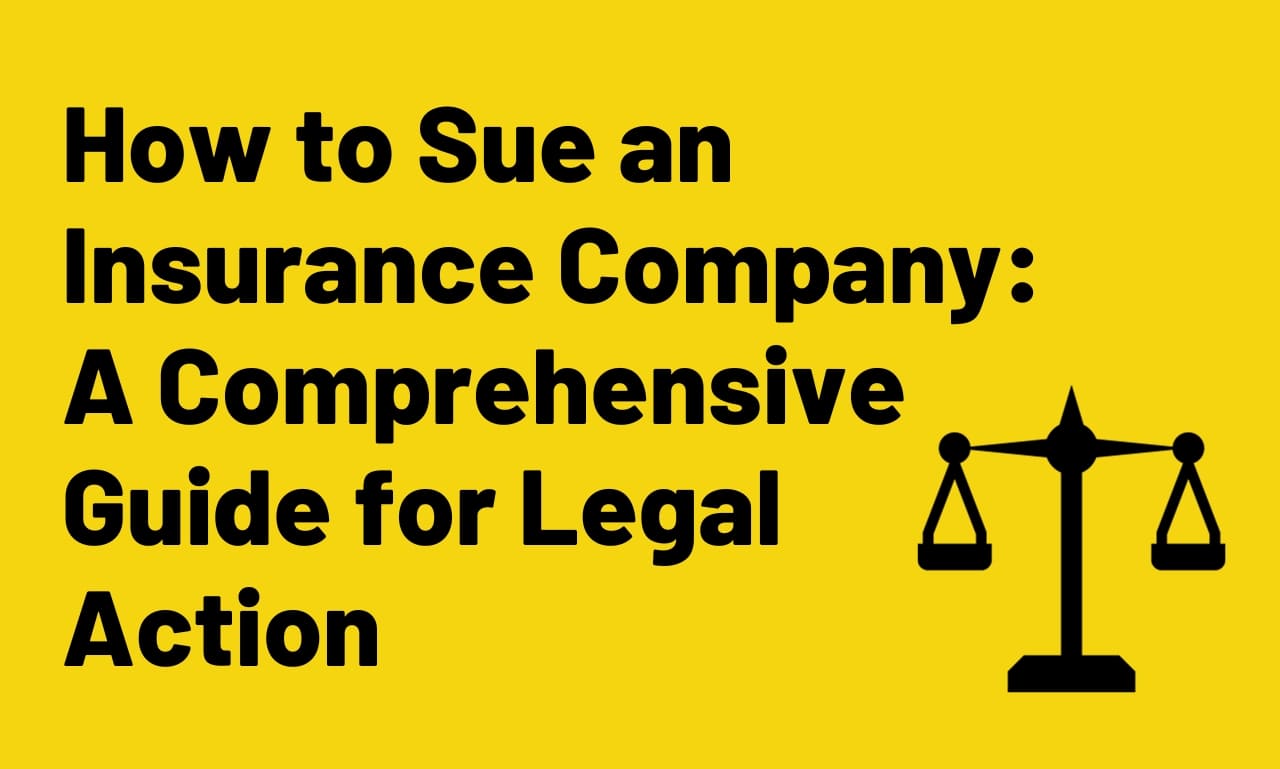How to Sue an Insurance Company: A Comprehensive Guide for Everyone : Navigating the legal process can be a complicated and complex process, especially when it comes to dealing with insurance companies. Whether you are an insured struggling to get fair compensation for a claim or someone who wants to understand your rights in the face of an insurance dispute, knowing how to effectively negotiate with insurance companies can has made all the difference. And we will provide you with the knowledge and techniques necessary to get the justice you deserve. From understanding the legal basis for suing an insurance company to practical tips for building a strong case, this blog will be your invaluable resource in navigating insurance.
Table of Contents
I. Introduction
A. Definition of Sue an Insurance Company
Suing an insurance company refers to the legal process by which a policyholder seeks compensation or resolution for disputes arising from the insurer’s failure to fulfill contractual obligations. It is a critical step taken when communication and negotiation fail to provide a satisfactory resolution.
B. Importance of Understanding Legal Recourse Against Insurance Companies
Understanding the legal avenues available for policyholders is crucial for protecting their rights and ensuring fair treatment by insurance providers. This article delves into the legal grounds, eligibility criteria, and procedures involved in suing an insurance company.
II. Understanding the Legal Grounds for Suing an Insurance Company
A. Breach of Contract
1. Explanation of Contractual Obligations
Insurance policies are essentially contracts between the policyholder and the insurance company. The insurer agrees to provide coverage in exchange for timely premium payments. A breach of contract occurs when either party fails to uphold its obligations.
2. Examples of Breach of Contract Scenarios
Examples of breach of contract may include the insurer refusing to pay a valid claim, delayed claim processing, or unjustified policy cancellations. Understanding these scenarios is crucial for identifying potential grounds for legal action.
B. Bad Faith
1. Detailing Bad Faith in Insurance Practices
Bad faith involves the insurance company’s intentional refusal to fulfill its contractual duties without a reasonable basis. This can include unjustified claim denials, deceptive practices, or unreasonable delays in claims processing.
2. Real-life Instances of Bad Faith Claims
Examining real-life instances of bad faith claims helps policyholders recognize signs of unfair treatment and strengthens their position when pursuing legal action. Examples could involve the intentional misinterpretation of policy terms or deceptive practices during the claims process.
III. Can You Sue an Insurance Company?

A. Eligibility for Suing an Insurance Company
1. Criteria for Filing a Lawsuit
Not every dispute with an insurance company warrants legal action. Criteria for filing a lawsuit may include exhausting internal appeals, demonstrating a clear contractual violation, and proving damages resulting from the insurer’s actions.
2. Factors Determining Viability of a Lawsuit
Factors such as the strength of evidence, the severity of the insurer’s actions, and the jurisdiction’s legal framework can significantly impact the viability of a lawsuit.
B. Legal Procedures for Suing an Insurance Company
1. Overview of Necessary Legal Steps
The legal process for suing an insurance company involves specific steps, including filing a complaint, discovery, negotiation, and, if necessary, proceeding to trial. Understanding these steps is vital for a policyholder contemplating legal action.
2. Potential Challenges and Obstacles
Potential challenges include the complexity of insurance law, the need for substantial evidence, and the possibility of facing a well-funded legal team representing the insurance company. Overcoming these obstacles requires careful preparation and a skilled legal representative.
IV. How to Sue an Insurance Company
A. Legal Representation
1. The Significance of Hiring a Competent Attorney
Hiring a competent attorney specializing in insurance law is crucial for navigating the complexities of legal proceedings. An experienced lawyer can assess the case, provide strategic advice, and represent the policyholder interests effectively.
2. Considerations When Choosing a Legal Representative
Considerations when choosing an attorney include their expertise in insurance law, track record of successful cases, and communication style. A strong attorney-client relationship enhances the chances of a favorable outcome.
B. Filing a Lawsuit
1. Step-by-Step Guide to Initiating a Lawsuit
Initiating a lawsuit involves preparing and filing a complaint, serving notice to the insurance company, and participating in pre-trial procedures. A step-by-step guide helps demystify the legal process and empowers policyholders to take informed action.
2. Document and Evidence Requirements
Accurate and comprehensive documentation is crucial when suing an insurance company. This includes policy documents, correspondence with the insurer, and any evidence supporting the claim. Thorough preparation strengthens the case and facilitates a smoother legal process.
Can You Sue Someone After Settling With Their Insurance
While settling with an insurance company often signifies the resolution of a legal matter, there are instances where individuals may contemplate suing the responsible party even after reaching an agreement. This decision can stem from a variety of factors, such as discovering new injuries or damages not initially apparent during the settlement negotiations.
In some cases, the full extent of injuries may only manifest after the settlement, prompting individuals to reevaluate the adequacy of the compensation received. Additionally, if there is evidence of fraud, misrepresentation, or a violation of settlement terms by the insurance company or the responsible party, it can provide legal grounds for reopening the case. The decision to sue after settling requires careful consideration, consultation with legal professionals, and the gathering of new evidence to substantiate the claim.
However, pursuing legal action after settling is not without its challenges. Time limitations, defined by statutes of limitations, may restrict the ability to reopen a case, emphasizing the importance of swift action. Moreover, both parties must agree to revisit the settlement, and the insurance company may be resistant to such reconsideration. Negotiating with the insurance company and presenting compelling reasons for reopening the case may be necessary before resorting to formal legal proceedings. Overall, while it is possible to sue someone after settling with their insurance, individuals should approach this decision cautiously, recognizing the complexities involved and seeking legal advice to navigate potential challenges effectively.
V. Conclusion
A. Recap of Key Points Discussed
Sue or Suing an insurance company is a complex but necessary process when policyholders face unfair treatment. Understanding legal grounds, eligibility criteria, and procedural steps empowers individuals to seek justice and hold insurers accountable.
B. Encouragement for Seeking Appropriate Legal Advice
While this article provides valuable insights, seeking legal advice from a qualified professional is paramount. A legal expert can assess the specific details of a case, provide tailored guidance, and significantly enhance the chances of a successful resolution.
FAQs
Can I sue my insurance company for any dispute?
Not every dispute warrants legal action. Criteria such as clear contractual violations and damages must be met.
What role does evidence play in a lawsuit against an insurance company?
Strong evidence, including policy documents and communication records, strengthens the policyholder’s case.
Is hiring an attorney necessary when suing an insurance company?
While not mandatory, hiring an experienced attorney significantly improves the policyholder’s chances of success.







1 thought on “How to Sue an Insurance Company: A Comprehensive Guide for Legal Action”
Comments are closed.